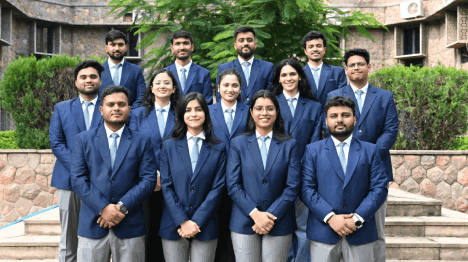- About Us
-
Academics
Schools
Programs
General Information
-
Faculty
The faculty members and researchers working at IIHMR University come from varied backgrounds including, but not limited to medicine, public health, management, economics, statistics, demography, human geography, social and behavioral sciences, rural development and pharmaceuticals.
-
Admissions
- Research
Publications & Journal
- Executive Education
Executive Programmes
- Online Certification Courses
ONLINE CERTIFICATION Courses
- Training
- Placements
- Contact
- Pradanya
- Blog
- Fee Payment
- NAAC
- IQAC
- NIRF
-
About Us
- About IIHMR University
- Board of Management
- Academic Council
- Board of Studies
- Research Board
- Institutional Review Board
- Finance & Audit Committee
- Departmental Research Committee
- Chairperson's Message
- President's Message
- IIHMR University Act
- Infrastructure
- Collaboration
- Ranking
- Board of Studies (School of Digital Health)
- Awards & Accolades
-
Academics
- Institute of Health Management Research
- School of Pharmaceutical Management
- ML Mehta School of Development Studies
- School of Digital Health
- SD Gupta School of Public Health
- MBA (Hospital and Health Management)
- MBA (Pharmaceutical Management)
- MBA (Development Management)
- MBA (Healthcare Analytics)
- Master of Public Health
- Student Manual – Cohort 9 (2021-2023)
- Master of Public Health (Offered by Johns Hopkins Bloomberg School of Public Health, USA in cooperation with IIHMR University, Jaipur, India)
- Ph. D.
- MBA CSR & ESG Management (Executive)
- MBA Sustainable Business Management (Executive)
- Common Information for all the Programs
- Academic Calendar
- Student Handbook 2020-21
- Committees
- Policies
- Annual Exam Calendar
- Library
- Faculty
- Officers of University
- Dean of Institute of Health Management Research
- Dean of School of Pharmaceutical Management
- Dean of School of Development Studies
- Dean of SD Gupta School of Public Health
- Dean of School of Digital Health
- School of Digital Health
- Faculty List A to Z
- Faculty List Designation Wise
- Faculty List School Wise
- Admissions
- Research
- Executive Education
- Training
- Placements
- Alumni
- Events
- Job Openings
- Contact
- Research
National Family Health Survey- 3 (NFHS-3) for State of Rajasthan and Madhya Pradesh
Agency : IIPS, Mumbai
Ministry of Health and Family Welfare (MoHFW), Government of India (GoI) had decided to conduct the third round of National Family Health Survey (NFHS-3) in the year 2005-2006. The Government of India had designated the International Institute for Population Sciences (IIPS), Mumbai as the nodal agency for coordinating the project United States Agency for Interational Development (USAID) provided the funding for NFHS-3 with supplementary funding from UNICEF for the nutrition component of the survey. NFHS-3 also received a part of its funding from the Gates Foundation, DFID and UNFPA. Macro International, USA provided technical assistance. The fieldwork was carried out by different field organisation working in the areas of population, health and family welfare. Institute of Health Management Research (IIHMR), Jaipur had been assigned to conduct the fieldwork in the states of Rajasthan and Madhya Pradesh.
The overall objectives of NFHS porgramme were: a) to strengthen India's demographic and health database by estimating reliable state-level and national-level indicators of population, maternal and child health, HIV/AIDS, and nutrition; b) to facilitate evidence-based decision making in population, health and nutrition; and c) to strengthen the survey research capabilities of Indian institutions and to provide high quality data to policy makers, family welfare and health programme managers, government agencies, NGOs, international agencies, and researchers
Specific Scope and Objectives of NFHS-3:
NFHS-3 provided the estimates of the levels of fertility, infant and child mortality, and other family welfare and health indicators by background characteristics and measure trends in family and welfare and health indicators over time at the national and state levels.
NFHS-3 also provided information on several new and emerging issues including: a) perinatal mortality, male involvement in family welfare, adolescent reproductive health, high-risk sexual behaviour, family life education, safe injections, tuberculosis, and malaria; b) family welfare and health conditions among slum and non-slum dwellers from eight cities of Chennai, Delhi, Hyderabad, Kolkata, Meerut, Mumbai and Nagpur; and c) HIV prevalence for adult women and men at the national level and for each of the six high HIV prevalence states, namely Andhra Pradesh, Karnataka, Maharashtra, Manipur, Nagaland, and Tamil Nadu.



